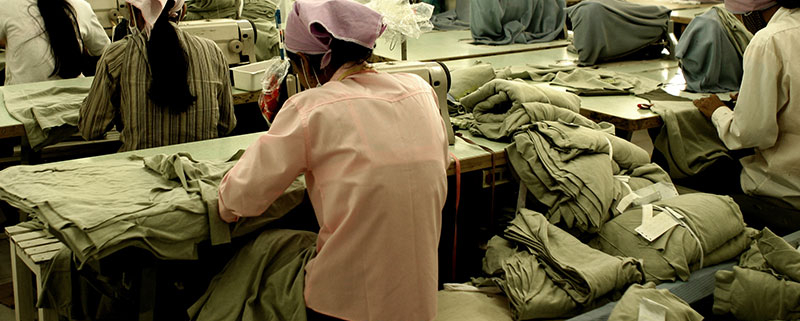by Lisa McIntosh
Slavery is not just a long-ago scourge confined to the ancient biblical account of the Israelites captive in Egypt, or the horrors of the trans-Atlantic slave trade between the 16th and 19th centuries.
Nor has it been restricted closer to home to the terrible practice of ‘blackbirding’, in which people from South Pacific islands were shipped off to work in indentured labour schemes on sugar plantations in Queensland or New South Wales, or flax mills near Auckland, from the mid-1800s until the first decade of the 20th century.
And the United Nations Association of Australia (UNAA) says that First Nations Australians have had an even ‘more enduring experience of slavery, originally in the pearling industry in Western Australia and the Torres Strait and then in the cattle industry’, as well as the pastoral industry, in which some Aboriginal workers ‘were bought and sold as chattels’.
Slavery is also a modern global evil. Specialist legal practice, research and policy centre Anti-slavery Australia estimates that 40.3 million people worldwide live in modern slavery which it says is ‘often hidden’ in everyday locations such as homes, restaurants, farms and building sites, as well as in places such as brothels.
Refugees, other displaced people and those living in poverty are among the most at risk of slavery, says Craig Heidenreich, who serves as Cross-Cultural Ministry Facilitator for the LCANZ and formerly worked with the Australian Refugee Association.
Craig does not doubt the ongoing devastating effects on the lives of people around the world of modern-day slavery, which includes such brutalities as human trafficking, early marriage, debt bondage, domestic servitude, sexual exploitation, forced criminality, child labour and sweatshop working conditions, ‘To say it couldn’t and wouldn’t happen today is fanciful’, he says, ‘Some families are so desperate they even sell their teenage daughters to survive, not always knowing the outcome for those girls.’
Nick Schwarz, the LCANZ’s Assistant to the Bishop for Public Theology, says that while ‘on the international scene slavery certainly hasn’t been abolished, in Australia various safeguards exist’ that should prevent such exploitative practices. These include the Modern Slavery Act (2018), last year’s ratification of the International Labour Organisation’s Protocol on Forced Labour and various child-protection laws.
However, he says, people are still exploited, with some migrant workers in Australia reportedly being so poorly paid that their income doesn’t cover basic living expenses, so they don’t have the choice to leave.
Other critical but often unclear factors in attempts to eradicate slavery are the supply chains behind the products we buy and use, which may be manufactured by slave labour.
‘Slavery is something that we empower with our choices’, Craig says. And Nick adds: ‘Consumers are wanting to buy from fair-trade labour supply chains.’ ‘But’, he says, ‘it’s not always easy to establish the provenance of a product.’
The responsibility for such information usually lies with the corporate sector, a fact highlighted by Australian anti-slavery advocate and mining magnate Andrew ‘Twiggy’ Forrest, whose Walk Free initiative is an international human rights group committed to the eradication of all modern slavery within a generation.
Walk Free successfully campaigned for Australia’s Modern Slavery Act and encouraged world religious leaders to sign a declaration against modern slavery, forming the Global Freedom Network as its faith-based arm. The LCA is one of 15 Australian religious organisations and communities which in 2015 became part of the Australian chapter by signing the Joint Declaration of Religious Leaders against Modern Slavery, which committed signatories to work actively against slavery.
One of the ways the Lutheran church does this is through its overseas aid and development agency, Australian Lutheran World Service (ALWS). Jonathan Krause from ALWS has seen first-hand the tragedy of bonded labour in countries such as Nepal and recounts the heartbreaking story of a woman who was a ‘Haliya’, or agricultural bonded labourer, for more than 20 years.
‘A Haliya has taken a loan from a landlord and works for that landlord until the loan is repaid’, Jonathan explains. ‘Because of exorbitant interest rates, the debt can last for generations. In 2021 the Nepalese Government freed the Haliya, but for many, there are no support systems to help them rejoin free society.
‘(ALWS partner) the Lutheran World Federation team has been working with the Haliya, providing household loans, training in kitchen gardening, seeds to plant and taps for drinking water. There has also been training provided in furniture making, embroidery and candle-making, and support for semi-commercial farming.
‘And even as that system changes, those people have been in poverty for so long, that they’re still enslaved by what they’ve suffered and lost and so ALWS is working with them to train them in businesses, help them become independent and build a new life.’
As individuals, we may choose to support credible organisations which actively work for the eradication of modern slavery. We also may make this a consideration in the products and services we choose to buy if we have the financial means to do so.
The official Fairtrade website shows products that are fair trade and so less likely to involve exploitation (https://fairtradeanz.org/product-finder)
Walk Free offers a suite of resources, including reports, policy documents, submissions and more information on the Global Freedom Network at www.walkfree.org/resources




